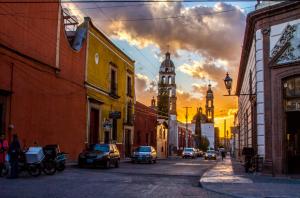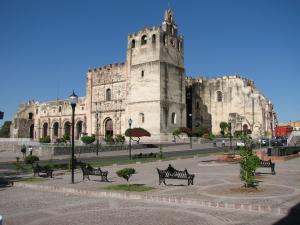Meet the Six Magical Towns of Guanajuato
MANHATTAN, NY, UNITED STATES, October 16, 2023 /EINPresswire.com/ -- Meet the Six Magical Towns of Guanajuato
Guanajuato, Mexico — The state of Guanajuato always feels touched by magic, but nowhere is this more true than in its six Magical Towns. Mexico’s term “Magical Towns” is a government designation given to towns and villages that exemplify aspects of tradition, culture, heritage, cuisine, history, or art. The state of Guanajuato is blessed with six of these special spots.
Dolores Hidalgo C.I.N.
The town of Dolores Hidalgo is much more than just a beautiful town in Guanajuato. It is actually known as the “Cradle of Independence” in Mexico thanks to the momentous event in history when hero Miguel Hidalgo delivered the “Cry for Independence” for Mexico from Spain.
One of the top attractions in Dolores Hidalgo is the Parroquia de Nuestra Señora de Dolores. This splendid parish has a carved pink-stone facade, and it was from here on September 16, 1810, that Father Miguel Hidalgo rang the bells and expelled the famous “Cry of Independence” as a call to rebel against the Spanish.
Mineral de Pozos
Much of Guanajuato's history is rooted in mining, particularly gold, copper, and zinc. The town of Mineral de Pozos was once the capital of mining in the region. In the late 19th century, it had approximately 300 mines around town, but none was more important than Santa Brigida. Today, this historic "Ghost Town" is full of life through its magic and mysticism.
Visitors to Mineral de Pozos have the opportunity to wander the relics of 19th and early 20th-century buildings, as well as plunge down into an old mine more than 200 meters below the earth's surface.
Among the top attraction in Mineral de Pozos is the 18th-century Parish of San Pedro, just in front of the beautiful Juarez Garden. Around the garden are lovely art galleries, boutiques, and craft stores.
But Mineral de Pozos is also a haven for outdoor adventure, from biking and horseback riding to hiking, rappelling, or simply walking through the wildflower-strewn fields.
Salvatierra
Surrounded by lush, green valleys and fed by the Lerma River, Salvatierra can trace its roots back to the pre-Hispanic Chipicuaro and Chichimeca cultures that settled here centuries ago.
The town’s Spanish heritage is a big part of its personality and tourism attraction with two emblematic traditions in Salvatierra tracing their roots to the colonial era: the Paseo de las Manolas Parade held every year on February 2nd, and the famed Marquesada Festival, a fusion of music, folk dance and the bullfighting performance art.
Yuriria
Yuriria, located in southern Guanajuato, carries with it a huge slice of history. Home to one of the oldest Spanish structures in Mexico, Yuriria is best known for the 16th-century Ex-Convento of San Pedro and San Pablo. Reminiscent of a medieval castle, the building houses a museum full of religious objects. The convent overlooks the Yuriria Lagoon, which was the first hydraulic project of the vice royal era in Mexico, as well.
Visitors to Yuriria marvel at the structures' Renaissance facade, its cloisters, and gardens. For the best view, consider a boat ride on the lake to visit the small islands.
Comonfort
Have you ever seen a traditional "molcajete"? These basalt rock mortar bowls have been used for centuries in Mexico as a cooking prep tool. Today they're used for serving bubbling meat and fish dishes, preparing spices, or serving guacamole. What makes them so unique is that they are typically carved from a single piece of rock. The Magical Town of Comonfort is known for its molcajateros artisans, who mold the stones to create these iconic Mexican kitchen pieces.
Among the top attractions in Comonfort are the historic Parish of San Francisco, the archaeological zone of Orduna de Abajo, the San Miguel Vineyard, and the Chapels of Indians, which dates back to the 16th century.
One of the main reasons Comonfort became a Magical Town is its incredible preservation of cultural manifestations, including native Otomí cuisine, the Chicimeca Gamares folk dance and it famous ceremonial tortillas, a peculiar culinary art consisting in stamping corn tortillas using wooden seals of various shapes and imagery with a purple pigment made from a plant known as ‘muicle’ or Mexican honeysuckle. These decorated tortillas represent an offering of gratitude for a plentiful harvest amid the religious festivities that take place in town.
Wine drinkers will enjoy a visit to the almost 150 acres of what is "Viñedos San Miguel”. With more than 140,000 vines, it is the largest vineyard in the state of Guanajuato. Its winery, with an area of 2 square acres has a tasting room, restaurant, area for events, and a gourmet store.
Jalpa de Canovas
One of the most historic Spanish towns in Mexico, Jalpa de Canovas traces its roots back to 1542, when the lands were granted to Don Juan Villasenor to construct a hacienda. Four hundred years later, the hacienda was one of the most thriving haciendas in the country. Today visitors can step back in time and visit what remains of the estate, including its gardens, the grain mill rooms, and the historic aqueduct.
Much of the town’s historic and cultural relevance is owed to the exceptionally fertile soil in the area which has fostered the emergence of prominent cattle and vegetable farms and a famous walnut tree plantation.
Prime examples of the local cuisine are: figs, cactus, walnut mole (sweet and spicy chocolate based sauce), pickled pigs feet, enchiladas with dried beef, and ‘caldo de zorra’ (a broth made with sour prickly pear).
HD Photos: Click here1
Media Contact: Carlos Lopez: carlos@enroutecommunications.com
For more information visit - https://guanajuato.mx/2
Guanajuato, Mexico — The state of Guanajuato always feels touched by magic, but nowhere is this more true than in its six Magical Towns. Mexico’s term “Magical Towns” is a government designation given to towns and villages that exemplify aspects of tradition, culture, heritage, cuisine, history, or art. The state of Guanajuato is blessed with six of these special spots.
Dolores Hidalgo C.I.N.
The town of Dolores Hidalgo is much more than just a beautiful town in Guanajuato. It is actually known as the “Cradle of Independence” in Mexico thanks to the momentous event in history when hero Miguel Hidalgo delivered the “Cry for Independence” for Mexico from Spain.
One of the top attractions in Dolores Hidalgo is the Parroquia de Nuestra Señora de Dolores. This splendid parish has a carved pink-stone facade, and it was from here on September 16, 1810, that Father Miguel Hidalgo rang the bells and expelled the famous “Cry of Independence” as a call to rebel against the Spanish.
Mineral de Pozos
Much of Guanajuato's history is rooted in mining, particularly gold, copper, and zinc. The town of Mineral de Pozos was once the capital of mining in the region. In the late 19th century, it had approximately 300 mines around town, but none was more important than Santa Brigida. Today, this historic "Ghost Town" is full of life through its magic and mysticism.
Visitors to Mineral de Pozos have the opportunity to wander the relics of 19th and early 20th-century buildings, as well as plunge down into an old mine more than 200 meters below the earth's surface.
Among the top attraction in Mineral de Pozos is the 18th-century Parish of San Pedro, just in front of the beautiful Juarez Garden. Around the garden are lovely art galleries, boutiques, and craft stores.
But Mineral de Pozos is also a haven for outdoor adventure, from biking and horseback riding to hiking, rappelling, or simply walking through the wildflower-strewn fields.
Salvatierra
Surrounded by lush, green valleys and fed by the Lerma River, Salvatierra can trace its roots back to the pre-Hispanic Chipicuaro and Chichimeca cultures that settled here centuries ago.
The town’s Spanish heritage is a big part of its personality and tourism attraction with two emblematic traditions in Salvatierra tracing their roots to the colonial era: the Paseo de las Manolas Parade held every year on February 2nd, and the famed Marquesada Festival, a fusion of music, folk dance and the bullfighting performance art.
Yuriria
Yuriria, located in southern Guanajuato, carries with it a huge slice of history. Home to one of the oldest Spanish structures in Mexico, Yuriria is best known for the 16th-century Ex-Convento of San Pedro and San Pablo. Reminiscent of a medieval castle, the building houses a museum full of religious objects. The convent overlooks the Yuriria Lagoon, which was the first hydraulic project of the vice royal era in Mexico, as well.
Visitors to Yuriria marvel at the structures' Renaissance facade, its cloisters, and gardens. For the best view, consider a boat ride on the lake to visit the small islands.
Comonfort
Have you ever seen a traditional "molcajete"? These basalt rock mortar bowls have been used for centuries in Mexico as a cooking prep tool. Today they're used for serving bubbling meat and fish dishes, preparing spices, or serving guacamole. What makes them so unique is that they are typically carved from a single piece of rock. The Magical Town of Comonfort is known for its molcajateros artisans, who mold the stones to create these iconic Mexican kitchen pieces.
Among the top attractions in Comonfort are the historic Parish of San Francisco, the archaeological zone of Orduna de Abajo, the San Miguel Vineyard, and the Chapels of Indians, which dates back to the 16th century.
One of the main reasons Comonfort became a Magical Town is its incredible preservation of cultural manifestations, including native Otomí cuisine, the Chicimeca Gamares folk dance and it famous ceremonial tortillas, a peculiar culinary art consisting in stamping corn tortillas using wooden seals of various shapes and imagery with a purple pigment made from a plant known as ‘muicle’ or Mexican honeysuckle. These decorated tortillas represent an offering of gratitude for a plentiful harvest amid the religious festivities that take place in town.
Wine drinkers will enjoy a visit to the almost 150 acres of what is "Viñedos San Miguel”. With more than 140,000 vines, it is the largest vineyard in the state of Guanajuato. Its winery, with an area of 2 square acres has a tasting room, restaurant, area for events, and a gourmet store.
Jalpa de Canovas
One of the most historic Spanish towns in Mexico, Jalpa de Canovas traces its roots back to 1542, when the lands were granted to Don Juan Villasenor to construct a hacienda. Four hundred years later, the hacienda was one of the most thriving haciendas in the country. Today visitors can step back in time and visit what remains of the estate, including its gardens, the grain mill rooms, and the historic aqueduct.
Much of the town’s historic and cultural relevance is owed to the exceptionally fertile soil in the area which has fostered the emergence of prominent cattle and vegetable farms and a famous walnut tree plantation.
Prime examples of the local cuisine are: figs, cactus, walnut mole (sweet and spicy chocolate based sauce), pickled pigs feet, enchiladas with dried beef, and ‘caldo de zorra’ (a broth made with sour prickly pear).
HD Photos: Click here1
Media Contact: Carlos Lopez: carlos@enroutecommunications.com
For more information visit - https://guanajuato.mx/2
Guanajuato
Guanajuato Tourism Board
+1 917-438-7096
email us here
Visit us on social media:
Facebook
Twitter
Instagram
1 https://enroute.egnyte.com/fl/MatPRzgwVU
2 http://guanajuato.mx/



